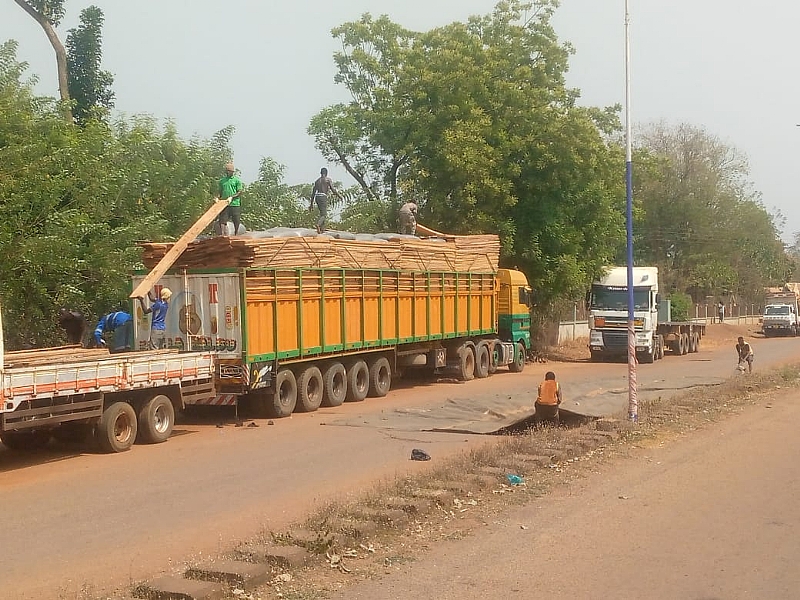Smuggling Attempt Thwarted: Cocoa and Lumber Seized in Bono Region, Ghana
The Bono Regional Office of the Ghana Cocoa Board (COCOBOD) has intercepted three heavy-duty trucks laden with cocoa and lumber suspected to be destined for illicit cross-border trade with neighboring countries. Acting on intelligence, authorities apprehended the trucks, bearing registration numbers GR 7237-21, AS 5278-23, and GR 314-24, at Nkrankwanta in the Dormaa West District of the Bono Region. The drivers, however, managed to evade capture, leaving behind their cargo concealed beneath a layer of lumber in an apparent attempt to deceive security personnel. The Bono Regional Administrator of COCOBOD, Mr. Michael Paddy Kwasi Asumanu, confirmed the seizure to the Ghana News Agency (GNA), highlighting the drivers’ tactic of using lumber as a cover for the illicit cocoa. The trucks are currently under the custody of the Bono Regional Office of the Forestry Commission (FC) in Sunyani while COCOBOD pursues a court order to formally take possession of the cocoa.
The attempted smuggling operation raises concerns about potential revenue losses for Ghana, as cocoa is a major export commodity and a significant contributor to the nation’s economy. Illegal cross-border trade undermines government efforts to regulate the cocoa industry, impacting pricing mechanisms, quality control, and overall market stability. Moreover, such activities deprive the state of crucial tax revenues that could be used to fund development initiatives and public services. The incident underscores the challenges faced by authorities in combating smuggling, which often involves sophisticated methods and organized networks. The fact that the drivers abandoned the trucks suggests they were part of a larger operation, and their escape makes it more difficult to trace the origins and intended destination of the illicit goods.
The involvement of lumber in the smuggling operation also raises questions about possible illegal logging activities and their environmental consequences. Deforestation and unsustainable timber harvesting pose significant threats to Ghana’s forest resources, contributing to biodiversity loss, soil erosion, and climate change. The Forestry Commission’s involvement in the investigation highlights the interconnectedness of these issues and the need for a multi-agency approach to tackle the multifaceted challenges posed by illegal cross-border trade. Further investigation into the source of the lumber is crucial to determine whether it was harvested legally and to hold those responsible for any illegal logging accountable.
This incident underscores the need for heightened vigilance and enhanced collaboration among relevant agencies to effectively combat smuggling and protect Ghana’s economic and environmental interests. Strengthening border controls, improving intelligence gathering, and prosecuting those involved in illegal cross-border trade are essential steps to deter future attempts. Furthermore, public awareness campaigns can play a crucial role in educating communities about the negative impacts of smuggling and encouraging them to report suspicious activities to the authorities. The successful interception of these trucks, despite the drivers’ escape, demonstrates the importance of timely information sharing and coordinated efforts between COCOBOD and the Forestry Commission.
The investigation into this smuggling attempt is ongoing, and authorities are working to determine the exact quantity of cocoa and lumber involved, as well as the identities of the drivers and their accomplices. Securing a court order to take possession of the cocoa will be a key step in the legal process, allowing COCOBOD to properly document and manage the seized goods. The Forestry Commission will also continue its investigation into the source of the lumber to determine whether any illegal logging activities took place. The outcome of these investigations will be crucial in holding those responsible accountable and sending a strong message that smuggling and illegal logging will not be tolerated.
This case highlights the persistent challenges posed by illegal cross-border trade and its potential ramifications for Ghana’s economy and environment. Continued vigilance, inter-agency collaboration, and public awareness are essential to effectively combat these activities and safeguard the nation’s resources. The successful interception of these trucks, despite the drivers’ escape, serves as a testament to the effectiveness of collaborative efforts and the importance of acting on intelligence. The ongoing investigation will undoubtedly shed more light on the extent of this smuggling operation and the individuals involved, paving the way for appropriate legal action and preventive measures to deter future attempts.














